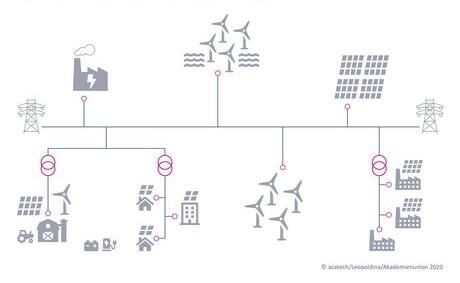Increasing numbers of private individuals, energy cooperatives and municipalities are deciding to make their important, albeit small contribution to the energy transition by generating power with their own solar or wind power systems. However, these “prosumers” will not be enough to meet power demand, especially since, as levels of energy sector integration rise, renewable electricity will also be the basis for climate-friendly mobility and heating. Instead, centralized and decentralized technologies will have to be astutely combined. Scientists from the “Energy Systems of the Future” (ESYS) project initiated by acatech – National Academy of Science and Engineering, the German National Academy of Sciences Leopoldina and the Union of the German Academies of Sciences and Humanities have been investigating how this approach can lead to a stable and sustainable system.
Exploit all potential for expanding renewable energies
The experts emphasize that the expansion of wind and solar systems will have to be environmentally and socially responsible in order to alleviate conflict with the environment and the population. Most citizens are willing to accept decentralized photovoltaic systems in built-up areas such as on roofs or in car parking or commercial areas. At the same time, there is a need for centralized solar and wind farms both onshore and offshore to generate electricity at low cost. However, the usable potential in Germany will probably not be sufficient to meet the energy needs of the future climate-neutrally. ESYS experts accordingly recommend importing renewable energy from regions with good solar and wind resources. Within Europe, green electricity can be transported via the integrated grid.




